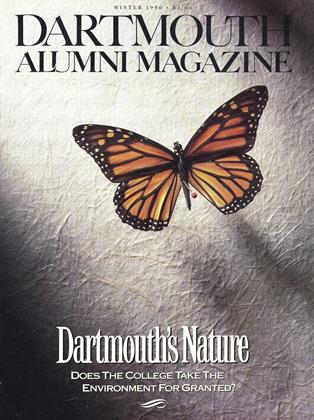PAPER OR PLASTIC?" ASKS THE checkout clerk.
"Neither, thank you. I am from the environmental movement!" Mikhail Blinnikov replies in Russian-accented English, taking out his string bag while he eyes the vast abundance in a Hanover supermarket.
Blinnikov is one of 45 Soviet students who have participated in a three-year-old exchange program in environmental studies based at Dartmouth. Their counterparts, 45 Dartmouth students who have spent spring term at Moscow State University, have stood in reverse astonishment before the empty shelves in Soviet food stores (other eye-openers are the low standards of public sanitation and the city's grimy air) The undergraduate exchange is the only one between the United States and the Soviet Union that focuses on an academic subject other than language. Yvonne Howell '81, who led Dartmouth's group in 1989, also sees the program as an opportunity for real contact with Soviets. "These people are botanists and chemists, not budding Americanists on the make."
Dartmouth participants, who need three years of college-level Russian to be accepted to the program, tend to be Russian majors who have taken an environmental studies course or two, while the Soviets are science majors who speak English well. "These people are being groomed to be leaders, no question about it," says Howell. "They'll be expected to make the investment pay off as researchers, as teachers—as people who can function comfortably in both cultures." They seem most intrigued by America's sophisticated regulation of environmental quality. "You have a very good system of laws that make people protect nature," says Kestutis Bendinskas, a Soviet participant. "We need to understand them. We have fewer such laws in our country and we're trying to make more and have them work."
 View Full Issue
View Full Issue
More From This Issue
-
 Feature
FeatureWHEN THE YOUNG TURKS CAME
December 1990 By John G. Kemeny -
 Cover Story
Cover StoryDartmouth’s Nature
December 1990 By Jonathan Kohl ’92 -
 Feature
FeatureHENRY’S SPIEL
December 1990 -
 Article
ArticleDR. WHEELOCK’S JOURNAL
December 1990 By E. Wheelock -
 Article
ArticleThe Case Against the Dartmouth Review
December 1990 By George B. Munroe -
 Class Notes
Class Notes1980
December 1990 By Michael H. Carothers
Nancy Davies
Article
-
 Article
ArticleNortheastern University—Evening Division
APRIL 1930 -
 Article
ArticleCollege Board Tests Adopted
January 1952 -
 Article
ArticleAlumni Council Election Results
-
 Article
ArticleThe Uhlmanns: serving up cereal and success
DECEMBER • 1986 -
 Article
ArticleHanover's First Aid Maestro
December 1942 By JOHN HURD '21 -
 Article
ArticleMaster Carpenter, Journeyman Blackmailer
NOVEMBER 1981 By Shelby Grantham



